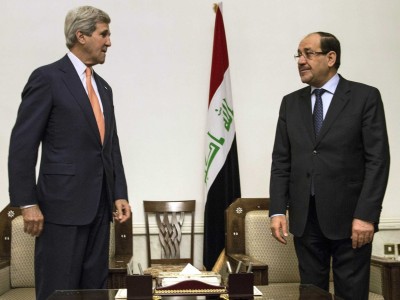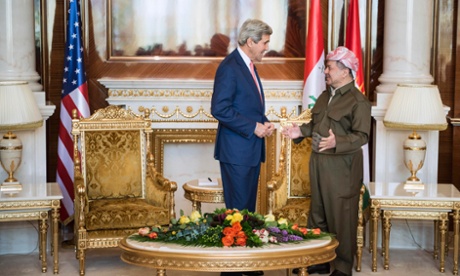LATEST: Iraqi Turkmen Politician Killed by Gunmen
UPDATE 1930 GMT: Witnesses say a market in Al Qaim, on the Syrian border, was hit by airstrikes on Tuesday. “Many civilians” have reportedly been killed.
EA sources say it is likely that Syrian military aircraft carried out the attacks.
The Pentagon rejected claims that US drones were responsible.
UPDATE 1500 GMT: US Secretary of State John Kerry has been giving interviews after his talks with Iraqi Kurdistan President Masoud Barzani.
Kerry played down Barzani’s denunciation of the “new democratic Iraq” and suggestion of Kurdish independence.
14 million Iraqis went out and voted. A very significant percent of the population chose democracy….
Even President Barzani today, who is opposed to the Prime Minister, made it clear that he wants to participate in the process that he wants to help choose the next government. And other leaders that I met with were all engaged and energised and ready to go to bat for a new governance.
So while he says there’s a new reality, the new reality is that they (Iraqis) are under attack from ISIS (Islamic State of Iraq and as-Sham) and they have realised that they cannot continue with this sectarian division.
Without naming Prime Minister Maliki, Kerry again linked US military intervention to a new Government in an interview with the BBC:
Without the formation of a government, without an adequate transformative decision by the leaders of Iraq, anything that the United States or others or allies or friends would do to try to fight back is going to be limited, if not impossible. You need a competent, unified government that is prepared. That’s the first step. The second step is, obviously, you’ve got to reconstitute the military, and that’s going to take this political leadership to help to do that. And then you’ve got to lay out a strategy and understand exactly what you’re doing….
There must be a government here so that there can be a strategy going forward, because just a strike alone is not going to change the outcome. You need to have a full-fledged strategy that is being implemented which is principally a political strategy.
Video of the Kerry-Barzani photo opportunity:
UPDATE 1015 GMT: Insurgents say they have completed the takeover of the Baiji oil refinery, the country’s main oil refinery at Baiji, 130 miles north of Baghdad.
The fighters took most of the complex last week, but resistance by some Iraqi security forces had continued.
A “reliable source” confirmed the news to the BBC, saying 160 Iraqi soldiers had finally laid down arms and agreed to safe passage to Iraqi Kurdistan, after overnight negotiations mediated by tribal leaders.
Baghdad’s chief military spokesman continues to insist that “terrorist attacks” have been repelled. An Iraqi army officer also said battle continues, even though insurgents took towers on the perimeter of the complex.
Officials said 19 people, including civilians, had been killed in airstrikes near the refinery.
The refinery is one of three in Iraq and handles all oil from the north of the country.
UPDATE 1000 GMT: Continuing his negotiations with Iraq’s political leaders, US Secretary of State John Kerry has met the President of Iraqi Kurdistan, Masoud Barzani.
No details have been released, which comes after Barzani called for the removal of Iraqi Prime Minister Nuri al-Maliki and suggested that Kurdistan might pursue independence.
However, the Kurdish leader said at their photo opportunity, “We are facing a new reality.”
Facing pressure from both the insurgent advance and the visit of US Secretary of State John Kerry, Iraq’s Prime Minister Nuri al-Maliki committed himself to the formation of a new Government on Monday.
After the meeting with Maliki, Kerry said Governmental representatives will meet on July 1. A Speaker of Parliament will be selected, then a President, then a Prime Minister.
The task would be challenging, even without the threat of the insurgent offensive. Iraq has been without a Parliament since April’s elections, when no party won a majority of seats and no ruling coalition was formed.
The US Secretary of State stepped back from Washington’s consideration of the removal of the Prime Minister: “Neither the US nor any country has right to pick Iraq’s leaders — that is up to the Iraqi people.”
Maliki, widely accused of accumulating power and alienating Sunni and Kurdish factions, made no statement after the meeting.
Kerry also saw Sunni Speaker of Parliament Osama al-Nujaifi and Ammar al-Hakim, the leader of the Shia Islamic Supreme Council of Iraq.
Nujaifi later said, “A federal system is a solution. It is constitutional and even the Shias are starting to come around to it. There will be autonomy within each federal state, but Baghdad will remain the central Government.”
Kurdish leader Masoud Barzani went even farther in an interview with CNN. He suggested that, as Kurds have seen the failure of the “experience of a new, democratic Iraq”, they may seek independence.
Barzani called for the removal of Maliki, since he “ignored warnings” about the Islamic State of Iraq and as-Sham, a leading force in the insurgency.
(Featured Photo: Brendan Smialowski/Reuters)
Iraqi Turkmen Politician Killed by Gunmen
Munir Kafili, a member of the Executive Council of the Iraqi Turkmen Front, was killed in Kirkuk on Tuesday.
Kafili, who also led the city council in Kirkuk, was shot in the head when unidentified gunmen attacked his vehicle in the military district. He died at the scene.
A political prisoner during the rule of Saddam Hussein, Kafili was in charge of distributing Turkish humanitarian aid in the city.
UN: At Least 1,075 Killed Since June 5
United Nations human rights staff in Iraq says at least 1,075 people were killed in Iraq between June 5 and June 22.
The UN reported that 757 civilians were killed and 599 injured in Nineveh, Diyala, and Salaheddin Provinces, the centers of fighting between insurgents and Iraqi forces.
Spokesman Rupert Colville said the figures “should be viewed very much as a minimum”.
Colville said at least another 318 people were killed and 590 injured in Baghdad and southern Iraq.
Iraq Body Count, which has monitored deaths by violence since the US-led invasion in 2003, records a trebling in killing this month — from 1,027 in May to 3,076 in June.
The Islamic State of Iraq and as-Sham claimed last week that it killed 1,700 captured Iraqi troops after the insurgent takeover of Tikrit.
Mass Killings by Insurgents of Turkmen Civilians South of Kirkuk
Residents and local security officers say insurgents and Sunni civilians have carried out mass killings of Shia Turkmen residents of villages south of Kirkuk.
Witnesses said four Turkmen communities were attacked, beginning last Tuesday. Kirkuk’s deputy police chief said he knew of at least 40 deaths in the villages — Brawawchli, Karanaz, Chardaghli and Bashir — and more bodies inside Bashir.
Residents said scores of people are missing and thousands have fled to Shia neighborhoods, including in Kirkuk, which is occupied by Kurdish forces.
70 Prisoners Killed by Police South of Baghdad
Four security sources have confirmed that police officers killed 70 prisoners as they were being transported south of Baghdad on Monday.
The police were escorting the detainees from a detention center, run by counter-terrorism police in Hilla, to a prison farther south because they believed the Islamic State of Iraq and as-Sham planned to free them.
The officers decided to kill the prisoners as retribution for ISIS claims that it executed 1,700 captured Iraqi troops after the capture of Tikrit almost two weeks ago.
One source said: “All those prisoners were criminals and involved in killings and explosions, and most of them were Al Qaeda or ISIS leaders. They should have been executed long ago.”
A police officer in Hilla echoed, “(The officers) just believed that those prisoners will not be sentenced or their crimes taken seriously, so they simply killed them.”
Immunity Agreement for US Advisory Forces
The Obama Administration said on Monday that it has accepted an immunity agreement from the Iraqi government for US Special Operations forces.
President Obama said last Thursday that 300 advisors would be sent to Iraq to help Baghdad check the insurgent offensive.
Washington refused to accept a similar arrangement in 2011. US military lawyers said assurances were insufficient and troops would stay only if legal immunity was approved by the Iraqi Parliament.


